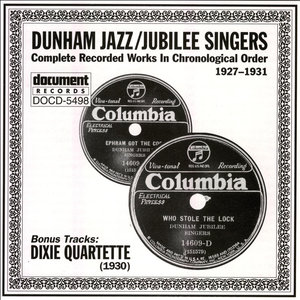
Dunham Jazz & Jubilee Singers (1927-1931)
- 流派:Blues 蓝调
- 语种:英语
- 发行时间:1996-01-01
- 类型:录音室专辑
- 歌曲
- 时长
简介
In 1996 Document reissued the complete recordings of the Dunham Jazz & Jubilee Singers, an Alabama-based vocal harmony group whose legacy was rescued from oblivion by various diligent record collectors and a production staff engaged in a vast multi-genre reissuing campaign of unprecedented proportions. Music on this album was transferred (without noise reduction) directly from original 78-rpm platters dating back to the years 1927-1931. The first two selections were cut for the Gennett label in Birmingham, Alabama. For the blues "Honey Turn Your Damper Down" the group was identified as the Dunham Jazz Singers, while the arcane "You Can Hear Those Darkies Singing" apparently called for them to be billed as the Bessemer Quartette. They became the Dunham Jubilee Singers the following year when they recorded "Holy Is My Name" and three other gospel titles at Gennett's world headquarters in Richmond, Indiana. The pianist heard on "Calvary" is believed to have been director and lead vocalist Charles Alf "Son" Dunham. This ensemble's big break came at the end of May 1930 when it made its first Columbia recordings in New York City. "Louisiana Babe" and "My Mama's Baby Child" were released under the name of the Bessemer Blues Singers. Billed as the Bessemer Singers and performing under the direction of James P. Johnson, Dunham's unit backed blues singer Bessie Smith on her only two topically religious recordings 11 days later. It's a shame that Document didn't include those two titles on this collection. The sudden death of Dunham's longtime collaborator and bass singer Leon Patrick precipitated a withdrawal from New York and the temporary dissolution of the ensemble. After Dunham returned to Alabama and rounded up some of the original members of the group, ten more sides were waxed in New York during May and June of 1931. Some of the source material for these tracks is of less than optimum quality, and by the producer's own admission tracks 11 and 13 were obtained on "inferior tape" and "included for completeness only," as no copies of the original recordings were known to exist. Even taking into account occasional flaws in audio quality, this collection provides access to cultural artifacts of great and lasting value. In their handling of great melodies like "Who Stole the Lock," "Ephram Got the C**n," and "If Men Go to Hell, Who Cares?," the Dunham Jazz & Jubilee Singers built upon tradition in ways that invite comparison with Bryant's Jubilee Quartet, the Utica Institute Jubilee Singers, and the Norfolk Jazz & Jubilee Quartet. Rather than including the Dunham unit's historic collaborations with Bessie Smith, Document ended the set with a pair of rather forced, fast-paced theatrically comedic religious routines recorded in New York in 1930 by the Dixie Quartette, about whom nothing is known.

